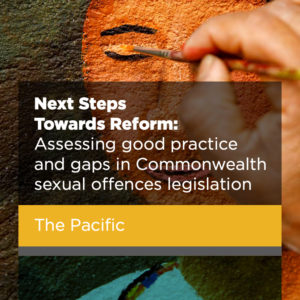Tonga’s sexual offences laws are in the Criminal Offences Act (COA). The Evidence Act (as amended) (EA) contains the evidentiary rules for all criminal offences, including sexual offences.
Tonga does not have comprehensive laws to address sexual violence. The most recent reforms were in 1988, when section 118 of the COA was amended by repealing the marital rape exemption, making rape within marriage a criminal offence.
Most of the sexual assault provisions assessed in this research do not meet good practice. For example, the definition of rape is very narrow and gender specific as it is committed by men against women. It does not take into account the full range of sexual violations experienced by victim/survivors, both male and female. Corroboration is required and prior sexual conduct of the complainant is admissible with leave of the court with insufficient safeguards for the privacy and other rights of a complainant.
The law does not define consent to sexual activity as free and voluntary agreement by a person, does not specify that evidence of resistance to the assault, such as physical injuries to the body, is not necessary to prove that sexual activity took place without consent. The COA also deems any person with an intellectual disability to be incapable of giving free and voluntary consent to sexual activity and uses derogatory terms such as ‘feeble minded, insane, idiot or imbecile’ to refer to such persons. There are no close-in-age defences to protect young people from being prosecuted for consensual sexual activity with their peers.
Consensual same-sex sexual activity is criminalised under the COA, with a maximum penalty of 10 years’ imprisonment and whipping of any male found guilty of having anal sex, whether consensual or not. Laws that criminalise consensual same-sex sexual activity, such as ‘buggery’ and ‘sodomy’, should be repealed and all non-consensual sexual acts, including anal ‘rape’, should be included in the standard sexual assault provisions, such as ‘rape’ and ‘sexual assault’, as well as in child sexual offences. All of these crimes should be gender-neutral.
Tonga is a state party to only two of the relevant international human rights treaties, the Convention on the Rights of Persons with Disabilities and the Convention on the Rights of the Child. Tonga is not a party to other relevant human rights treaties including the Convention on All Forms of Elimination against Women, International Covenant on Civil and Political Rights and Convention against Torture and Other Cruel Inhuman or Degrading Treatment or Punishment.
Read more about the criminalisation of LGBT people in Tonga.
The full assessment of Tonga is available here.



